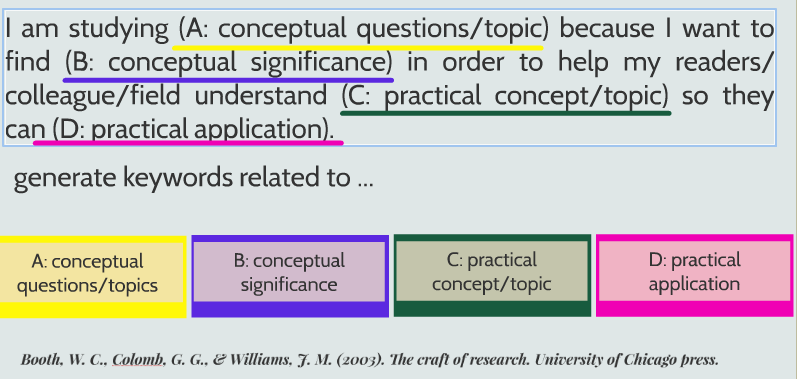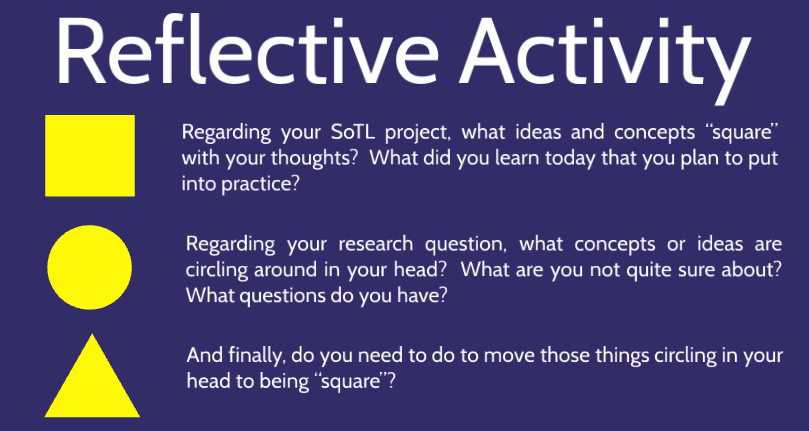[Previous: Workshop I – SoTL 101]
[prezi id=”hmnfmx6agoz9″]
Prezi: Stetson SoTL Workshop Series
Friday, February 3 in Library 25L
Workshop Goals
You will …
- generate keywords to form the basis of a literature search,
- refine your SoTL research question by clarifying the conceptual significance of the work and identifying potential stakeholders, and
- identify current challenges and develop strategies for your SoTL literature search.
PREPARE …
- review the recap from the first workshop here.
- submit your SoTL research question to the survey.
- bring a single article related to your question.
- touch base with your accountability buddy.
- read Hutchings (2000).
Additionally, Peter Felton provided references for three articles that provide a range of methods/approaches to their SoTL questions. I’ve linked them below for your reference.
ENGAGE …
[Review the presentation]
[Workshop2-Handout]
Activity 1: Ice-breaker Jigsaw
- You are setting out to find work about your problem but your searches are not fruitful. You suspect you are not finding the right words. What should you do?
- You submit for publication and the reviewers identify you missed a large portion of the literature. What should you do?
- You want to study something to publish where there are several papers in the early 70’s and nothing since. Is this something you should pursue?
A summary of research questions (included in handout)
- What works ..
- What is …
- Visions of the possible …
- New conceptual frameworks …
Activity 2: Frame your SoTL Research question

Ms. Grace Kaletski, Assistant Professor, Learning and Information Literacy Librarian joined the group to talk about the resources available for SoTL in the library, which she has collected into a handy SoTL Research Guide.
TIP of the Day: Did you know that you can add the Stetson library to google scholar? You will be able to click through to the full text articles if they are available.
REFLECT

ACCOUNTABILITY
Ticket out the door: Reflect on how today’s work may have triggered another iteration of refinement of your research question. Once you are done, before leaving, enter the revised research question at
https://www.surveymonkey.com/r/SoTL1
Homework: “Mine” your article that you brought with you today to find three more articles. Identify the methodologies used in those articles.
Upcoming workshops
- Feb 24, 2-5pm: Choosing your methodology (III)
- Mar 31, 2-5pm: Resources & planning for dissemination (IV)
- Apr 7: SoTL Roundtable at the Colloquium on Teaching & Learning Innovation
Resources
- Hutchings, P. (2000). Approaching the scholarship of teaching and learning. In Opening Lines: Approaches to the Scholarship of Teaching and Learning. Menlo Park, CA. (download full pdf)
- Mercer-Mapstone, L. D., & Kuchel, L. J. (2016). Integrating Communication Skills into Undergraduate Science Degrees: A Practical and Evidence-Based Approach. Teaching & Learning Inquiry: The ISSOTL Journal, 4(2), 1–14. https://doi.org/10.20343/teachlearninqu.4.2.11
- Goldschmidt, M. (2014). Teaching Writing in the Disciplines: Student Perspectives on Learning Genre. Teaching & Learning Inquiry The ISSOTL Journal, 2(2), 25–40. https://doi.org/10.20343/teachlearninqu.2.2.25
- Bernstein, D., & Greenhoot, A. (2014). Team-Designed Improvement of Writing and Critical Thinking in Large Undergraduate Courses. Teaching & Learning Inquiry The ISSOTL Journal, 2(1), 39–61. https://doi.org/10.20343/teachlearninqu.2.1.39
